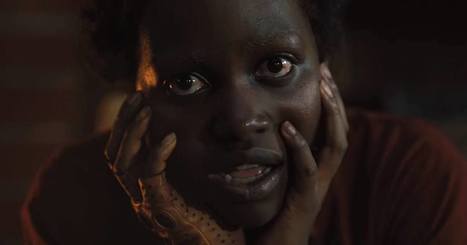Later this week, popular anonymous messaging app Kik will shut down. Just a few days ago, company CEO Ted Livingston announced that he would pull the plug on the messenger, opting instead to focus on building a cryptocurrency — the only pivot a…
Get Started for FREE
Sign up with Facebook Sign up with X
I don't have a Facebook or a X account

 Your new post is loading... Your new post is loading...
 Your new post is loading... Your new post is loading...
Instagram influencers are akin to huge businesses, but Facebook’s moves to decrease social pressure and improve users’ happiness threaten to upend social-media celebrities’ business models and could boomerang to hurt Facebook itself.
Dr. Pamela Rutledge's insight:
Changing policy in response to a single fear (social comparison) treats the symptom, it's not the cure and it disregards the complex system of social and economic factors that make up online engagement. #mediapsychology
Dr. Pamela Rutledge's insight:
The real headline: Bianca Devins' murder is 'not an Instagram story,' domestic violence expert says. It's not very often when you see a news headline about such a tragic story that just BEGS for something to blame to not point the finger at social media. Well done USA Today. Flaunting crimes isn't new. The sharing of the girl’s dead body on social media screams narcissist showing off and an attempt to reclaim power and feel in control. Male narcissists have been shown to become aggressive when romantically rejected. It violates their inflated self-image and they feel justified in taking action and showing off to get approval. #mediapsychology
If television is a lens through which we can view ourselves, most of the women my age seem to be watching these four very bingeable series — and for good reason.
Dr. Pamela Rutledge's insight:
The power of entertainment: We find meaning in the stories we watch. Dramas and comedies alike. Stories expand our 'database' of possibilities and emotions; they allow us to reflect on the past, reframe the future and create affiliations and enhance connections through shared experience. #mediapsychology #savoring #thepowerofstories
For Sen. Elizabeth Warren, selfies are a way to connect with supporters on the campaign trail and a marketing tool.
Dr. Pamela Rutledge's insight:
Taking selfies on the campaign trail is a smart strategy to effectively engage with voters. Images deliver more information than text — they include emotion, context, and attributed meaning. They're a powerful way to tell a story that gives the voter a sense of personal connection and a stake in her candidacy. It becomes a Choose Your Own Adventure event for every participant. #selfies #mediapsychology #storytelling
The dog Snapchat filter makes me look like a hoe, not a puppy. The big mouth filter is supposed to be funny and cute
Dr. Pamela Rutledge's insight:
More than anything, the filters seem to be a way to play with our look and experiment with how we present ourselves. This could eventually even change paradigms. One of the ways people learn is by watching others and evaluating the outcome. Another is to experiment. This can be nuanced or more overt expressions, fleeting or more permanent. At the same time, it's important to be respectful of broader social implications of technology like this.
Use narrative analysis to understand the “why” in consumer behavior trends
Dr. Pamela Rutledge's insight:
Predicting human behavior requires us to make assumptions about cause and effect, which are proxies for the consumers’ priorities, motivations and goals. Narrative analysis--identifying narrative and visual frames and customer stories--enables me to understand the “why” along with the “what” of measured behavior. The "what: tells the past. The "why" is the key to the future. #mediapsych #datastrategy
From
www
After Justin Bieber's apology for his pregnancy prank, why is social media outrage so difficult for stars to avoid?
Dr. Pamela Rutledge's insight:
Fame, whether based on talent or notoriety, creates expectations and turns celebrities into role models and influencers. The upside comes with a cost--the responsibility of what you say in a social media world. Social media is the ultimate amplifier, allowing celebrities to expand audience awareness and reap the financial benefits. If you're popular or, in the case of brands, your campaign is successful, people are hanging on your every action and that means every action is also under scrutiny. You don't get the benefits without the downside. In this uber-sensitive world, it's more important than ever to look at content through the perspective and mental constructs of the audience--unless you don't care if you make them mad, hurt their feelings or offend their sensibilities. For some people, any notoriety fills the bank accounts or gets followers. For others, it has the opposite effect. Know your audience.
Horror films are a way to manage our existential fears...One sentence sets all the chaos off in Us: "There's a family in our driveway." This duplication of the self undermines our sense of reality, control and who we are.
Dr. Pamela Rutledge's insight:
I understand why some people like horror films and why certain motifs are particularly scary and uncomfortable. (That doesn't mean I go see them.) The #USmovie is a great example of all the instinctive and psychological triggers that elicit fear coupled with the great acting to pull it off.
From Jenna Jameson’s keto diet progress to the #10YearChallenge, people love transformation pictures. But do they do more harm than good?
Dr. Pamela Rutledge's insight:
A good rule of thumb is that images for things you can change — teeth straightening, hairstyle, painting a room — can be inspirational. Looking at things you can’t change — body build, height, the fact that you’ll never own a divine midcentury LA home like Mandy Moore — might be counterproductive. Best advice from Parks: Don't look at things that make you feel crappy."
Time spent on Instagram, Snapchat or Facebook probably isn't driving teenagers to depression, a new study contends.
Dr. Pamela Rutledge's insight:
Here's an article that WON'T make headlines because so many people are convinced that social media is bad. Hard to combat beliefs with science. Bravo to @HealthDayNews for paying attention! Social media behaviors are complex, not one size fits all. Not to mention that mental distress and disorders are complex with multiple factors and causes. I was encouraged, too, by the responsible analysis the researchers made.
The film industry has turned everything from troll dolls to emojis into big-screen blockbusters -- and it looks like another part of Internet culture is next in line.According to a new report from Deadline, Paramount Players has acquired the script to Unboxing, a script from Ice Age: The Meltdown [...]
Dr. Pamela Rutledge's insight:
Banal or profound? Unboxing videos as a movie premise - Pandora's box gets a facelift
California Choices is a one-stop-shop for nonpartisan voter information in the Golden State. The California November 6th election has 11 statewide ballot propositions and general elections for both Gubernatorial and Senatorial candidates, among others. To help empower voters to make informed decisions this Election Day, California Choices provides succinct, nonpartisan resources to get voters the information they need without being overwhelmed.
Dr. Pamela Rutledge's insight:
PLEASE VOTE If you don't like the way the government is going, don't just complain PLEASE VOTE. Don't be put off by the complexity of the ballot. I live in CA and It took me nearly two hours to research the ballot propositions and all the people running for "non-partisan" offices. The California Choices website is great because it has links to an explanation of each proposition. It also shows you which organizations, parties and news sources have endorsed each one.
We all make judgments from social influence - recommendations on products and people to manage information. This is a good source to cut down on the ballot research. Research is important because there is such a thing as nonpartisan.
I don't know a good solution to finding out about all the associate justices, school board officials and city council members who are all making decisions on our behalf based on their beliefs about what's important. Find out what you can and make sure their beliefs align with yours. At the very least, fill in the boxes on the things you care most about and skip the rest. JUST MAKE SURE YOU VOTE! |
Apple’s Find My Friends, Google Maps location sharing and Life360 let you stay on top of where your family and friends are, which can be both incredibly creepy and incredibly helpful.
Dr. Pamela Rutledge's insight:
Should YouTrack? Is it useful sometimes? Sure! Could it damage your relationship? Absolutely. From a psychological perspective, these apps force us to address our beliefs about privacy, ‘feeling watched’ and the relational costs versus benefits of tracking. It all boils down to trust and establishing an honest set of ground rules. #mediapsychology
As it turns out, read receipts could be causing the people you text to deal with confusion, anxiety, and misunderstandings.
Dr. Pamela Rutledge's insight:
Technology can trigger our cognitive biases--assumptions and attributions we make, often without thinking, applying social behaviors and rules to technology-mediated behaviors. A read receipt is like saying "did you hear me?" and our inclination is to assume that the stony silence of no response means we don't matter. #mediapsychology
Will Smith recently became an investor in Step, a mobile-based banking service app for teenagers with the goal of promoting financial literacy.
Dr. Pamela Rutledge's insight:
Well done Will Smith! Teaching financial literacy is so necessary. Technology impacts all kinds of behaviors and as money becomes less tangible and more digital (auto-pay, click to purchase, credit), it's harder to understand how to manage it (and easier to dig really big holes!) #medialiteracy #financialliteracy #mediapsychology
From
www
The McClures of New Jersey, aka the ‘McClure Twins Family,’ catapulted to YouTube stardom three years ago, then soon discovered the downside of internet fame.
Dr. Pamela Rutledge's insight:
The rise of Influencer marketing as created a new dimension in storytelling, somewhere between Reality TV and true confessions. It is ripe with archetypes and emotions. While it has disrupted multiple business models, it also raises the ante on the increasing monetization of personal lives and can put them in direct conflict with values, ethics and well being, especially when it comes to young children. More to come. #mediapsychology #influencerpsychology #influencerparenting
From
expmag
In the debate over where devices belong, weddings are the last frontier, where a cultural clash rages over etiquette, boundaries, and the possible loss of something sacred.
Dr. Pamela Rutledge's insight:
We can set boundaries and rules in new ways. Some will argue that there is a sense of propriety and respect that a wedding or other event demands. But these are rules that will change over time with technology and expectations. People need to feel comfortable establishing the rules that work best them in a given situation. If it's your wedding, you get to make the rules--but recognize that others love you and want to share in your moment. Providing a "screen-OK zone" can satisfy both. #mediapsych
Virtually, we can play these games together, and we can all have this shared experience of conquering that beast or winning the game or being the clutch person at the last second and getting that comradery of 'yeah, we did it.’ That kind of social input is just as important as sunlight is to your body.
Dr. Pamela Rutledge's insight:
Technological accessibility is an important part of inclusion, whether it's designing for more types of users or using technology to overcome other kinds of access barriers.
No news is good news for clinics, fitness centers and other businesses as they avoid partisan politics on their televisions.
Dr. Pamela Rutledge's insight:
TV shows in waiting rooms can set a mood that frames the doctor-patient relationship. There’s research that shows that it’s in a patient’s best interest to be relaxed, calm and in a positive mood when they visit with the healthcare professionals. It decreases pain and makes patients more optimistic and resilient. Conversely, if they’re anxious, procedures hurt more.
The age of automation is here and there’s no turning back. The future of work holds many opportunities for those willing to learn and adapt.
Dr. Pamela Rutledge's insight:
Media psychology looks at technological and systemic structures to identify the behavioral impact of change from automation to social shifts in order to proactively adapt in a way that supports positive human growth. The core assumptions driving educational content are not adapting as fast as the world is changing. Traditional models train people to equate what they do with who they are--identity-- rather than to acquire critical thinking and flexible skills and attitudes that fit a rapidly changing world. #mediapsychology
I lost my mother when I was four and she was just 25. The tragedy set me on a path that among other things, includes a lifelong advocacy of women’s rights.
Dr. Pamela Rutledge's insight:
For many, #MeToo has become a litmus test of tribalism. When this happens, it can be used irresponsibly as a weapon rather than a movement to achieve social change. When presumptions of guilt are acted upon through boycotts and social shaming, when questioning or asking for evidence becomes disloyalty, it runs the risk of undoing a lot of the good that has been achieved.
Tips on how to parent digitally ethical kids in the 21st century from the new book 'Raising Humans in a Digital World.'
Dr. Pamela Rutledge's insight:
The best reviews come from skeptics. See this thoughtful piece on @dianagraber 's new book Raising Humans in a Digital World
26% of U.S. adults in one Pew survey said they had deleted the Facebook app from their phone in the past 12 months.
Dr. Pamela Rutledge's insight:
The new year is a time for taking stock. Whether you choose to delete social media apps or manage their use, start with YOUR goals, take back your power. Deleting an app should follow intention and goals, not be a kneejerk reaction. Choice and intention develop self-control and increase positive emotions.
Smart devices are already equipped to collect physiological data. Could they use it to predict a fight with your spouse?
Dr. Pamela Rutledge's insight:
It's interesting how quickly the narrative goes from "getting useful information" to presuming total reliance on technology as if there's no positive middle ground. This 2017 article shows how little progress we've made in our technophobia. BTW, I agree with Dr. Nadig that conflict, respecting differences and learning to have personal boundaries are critical to healthy relationships. That is a separate issue from whether technology can provide information that helps someone learn more productive behavior habits. Have more emotional control should actually help people resolve conflict because it diminishes the "fight or flight" response and allows more room for empathy. #mediapsychology #positivemediapsychology |


































If anonymous chat remains a need beyond the nefarious--such as identity exploration--and isn't just a shiny-penny experiment, as it was for many, then a new product will emerge. But let's be serious. This was a business decision. Cryptocurrency triggers a lot less moral outrage as a business model than enabling anonymous chatting.